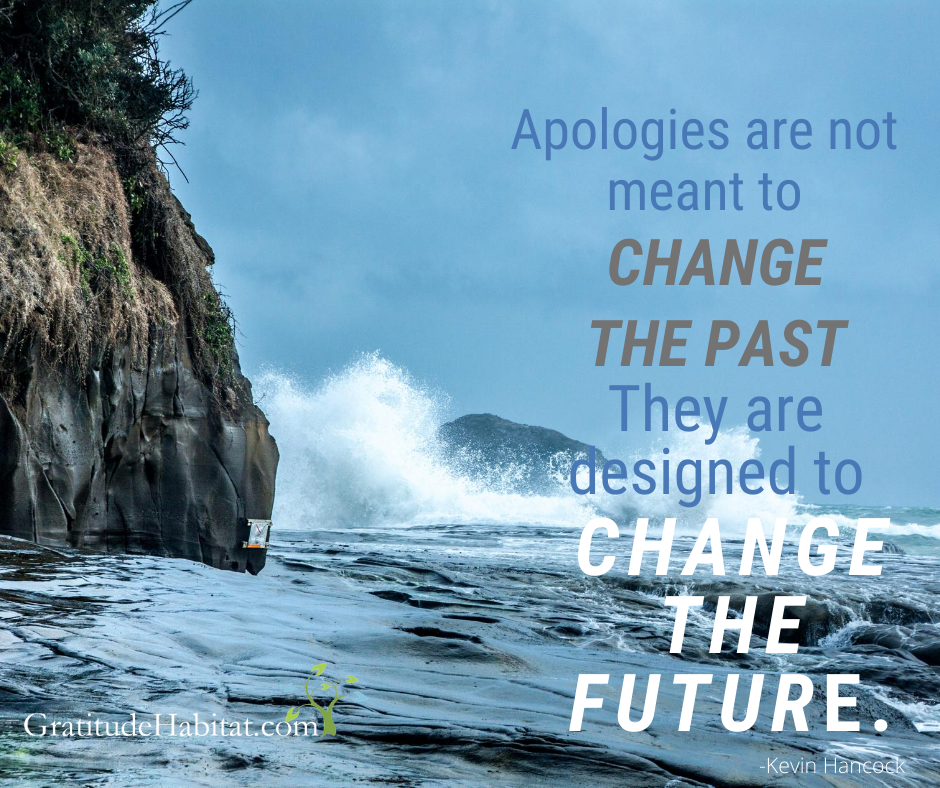Living In Gratitude: Heartfelt Apologies Heal Relationships
We’ve all had someone say something that hurt our feelings and we have probably done the same to others.
We have all encountered people acting out inappropriately, either in a personal or professional setting, and some of those individuals never apologized.
Or maybe they said they were sorry but you could tell they really didn’t mean it or their apology was filled with explanations that offered excuses for their behavior.
We are all human and we all make mistakes. Apologizing when we hurt someone else intentionally or unintentionally is a vital skill.
Apologizing is hard. Admitting we were wrong is hard. Taking responsibility for hurting someone else is hard. Being vulnerable is hard.
But it is also a powerful reconnector.
An article in MindTools discussed how a sincere and properly delivered apology can go a long way to healing and rebuilding relationships.
An honest apology is more than just words. It shows remorse and acknowledges that your actions caused someone else pain.
As the Mind Tools article discusses, apologizing opens the door to dialogue. Your willingness to admit your mistake allows the other person to share their thoughts and how they felt.
It acknowledges that your behavior was unacceptable. This rekindles trust and reestablishes the relationship. It also helps both parties talk about what is and is not acceptable.
An apology restores the other person’s dignity, especially if they unjustly blamed themselves.
There are a number of negative consequences that arise when we fail to apologize.
- We damage our relationships
- It results in reduced trust
- It harms our reputation
- Our career opportunities become limited
- Our effectiveness lowered
- It results in others not wanting to be around us
- A toxic environment filled with anxiety, animosity and tension is cultivated
Why is saying “I’m sorry” so difficult?
- It takes courage to admit we were wrong or behaved badly
- It makes us feel vulnerable
- Apologizing can cause feelings of shame or embarrassment
- Some people subscribe to the “never apologize, never explain” mantra. This form of arrogance will never engender solid relationships, or serve to inspire others.
Now that we’ve looked at all of the reasons why saying I’m sorry is a worthwhile practice, let’s talk about how to effectively apologize.

Here are some tips on how to say you are sorry and really mean it.
- Express true remorse: Be sincere and authentic. Speak from the heart. Timing is everything-it is always best to apologize sooner versus later.
- Admit responsibility: Empathize and demonstrate that you understand how the other person must have felt.
- Make amends: Take action to make it right. Say, “If there is anything I can do to make this up to do, please tell me.” Or “I will work on better managing my stress so I don’t snap at you or anyone else.” Be sure to not give too much out of guilt or offer a token gesture-both can backfire.
- Assure & ensure it won’t happen again: Reassure the person to whom you are apologizing that that you will do your best to change your behavior. Give the person permission to let you know if you are falling back into your old ways.
Don’t make excuses or offer explanations. They tend to shift the blame to others. Keep your apology simple and take ownership. “I am so sorry I snapped at you yesterday.”
Don’t take too much responsibility. There is a fine line between taking full responsibility for your actions and taking on too much.
Understand that you may not be instantly forgiven. Allow the other person time to heal and process your apology as well as to see that you’ve changed.
In many business situations, an apology may open the organization up to legal scrutiny. It is always wise to have a conversation with your manager or HR to discuss this potential and find an appropriate way in which to make amends without embroiling the company in legal issues.
Learning the art of a heartfelt apology is humbling. Taking responsibilities for our foibles and failures is a life lesson. When you are wrong, admit it by saying you are sorry. It is a powerful way to show another person that you value and appreciate them.
May your day be filled with gratitude and good things.






